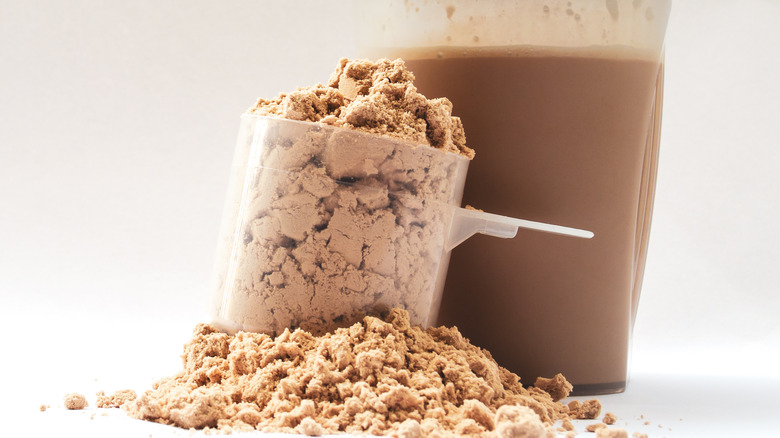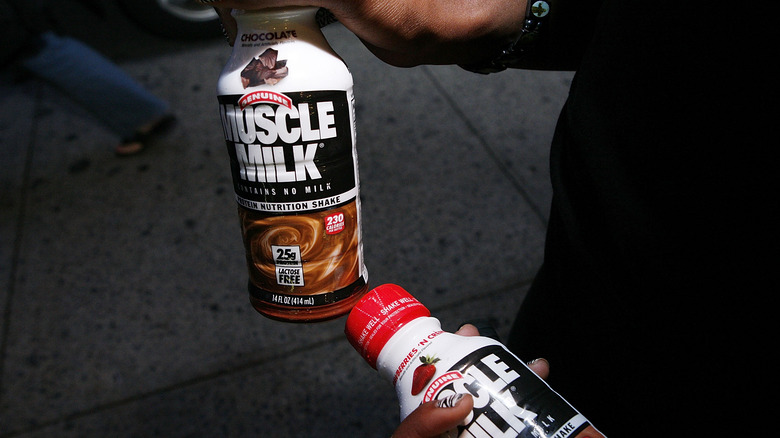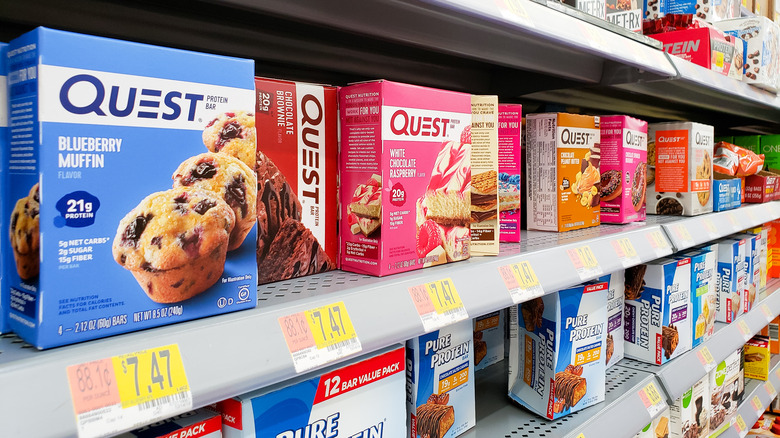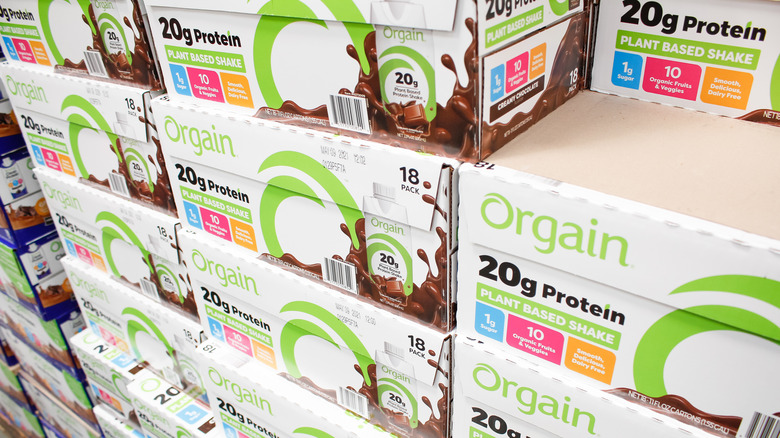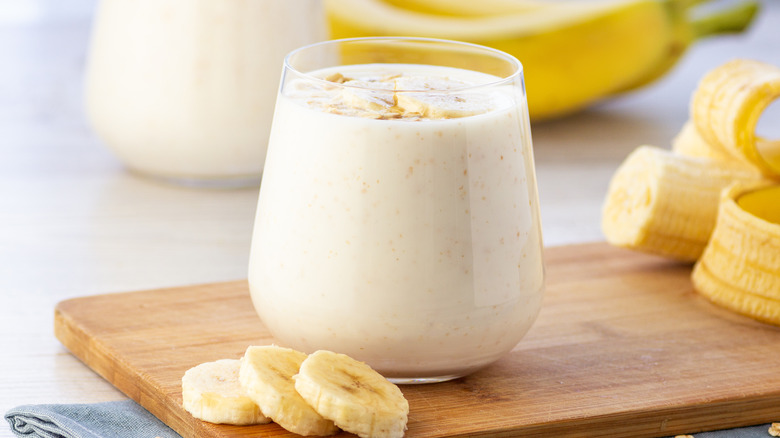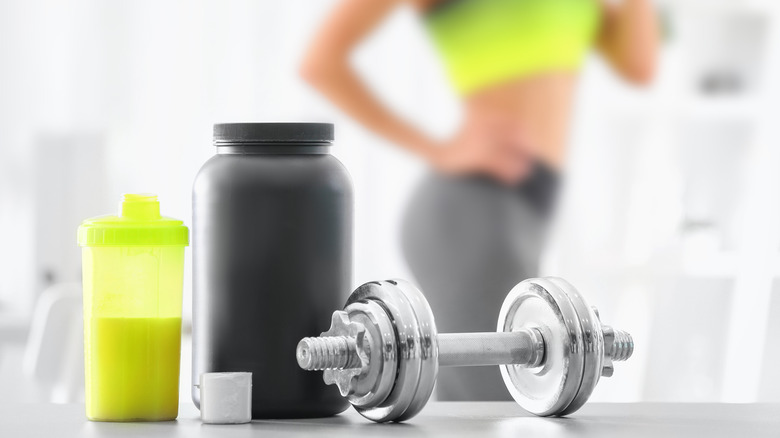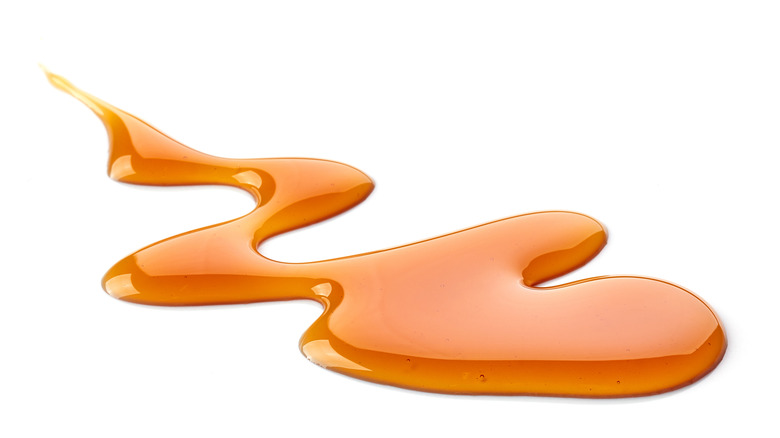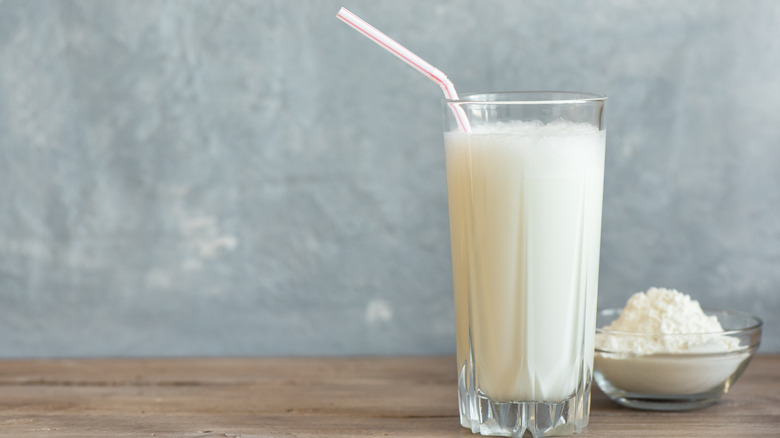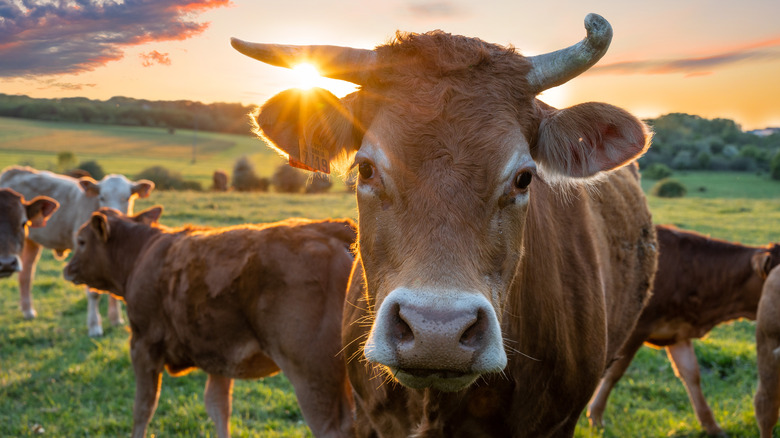Popular Protein Powder Brands, Ranked Worst To Best
Protein has quite the reputation, especially among fitness fanatics. At its core, protein is one of the three macro nutrients — fat and carbohydrates are the other two. Each macronutrient serves a specific, functional purpose within the body, and nutritionists and experts have determined exactly how many grams of each we should be consuming for optimal health.
Protein is the main structural building block that our bodies need. If you are endeavoring to incorporate more protein into your life, protein powders are a great nutritional supplement to add to your daily routine. However, not all protein powders are created equal. From dairy-filled whey options to heavy-metal-laden plant-based options, the sheer list of pros and cons of each brand is enough to make our heads spin.
The Clean Label Project has conducted extensive research in order to educate consumers about what their nutritional supplements truly contain. Protein powders are popular, no doubt, but since the FDA doesn't strictly enforce the claims published on the nutritional labels, it is important for us as consumers to do our due diligence when it comes to providing our bodies with the building blocks they need. Here are some of the most popular brands of protein powders ranked from worst to best, based on nutrition and the amount of suspicion their ingredient lists inspire.
Protein powder basics
All of the protein in our body is made up of some combination of 21 amino acids. Amino acids are essentially incomplete proteins that come together to create a complete protein. Some of the necessary amino acids are manufactured within our bodies, while others must be obtained through food. Enter protein powders — a quick, easy, and tasty way to supplement your protein needs.
The market is flooded with protein powder options that come from a wide variety of sources with more flavors that we could even dream up (we are looking at you, butter flavor). The Clean Label Project's 2018 battery of studies elicited some rather horrifying results about the nitty-gritty deets of the most popular protein powders in the market. Some of the most well-known brands contained lead, cadmium, and even BPAs. The sad truth is that 70% of all of the protein powders that were tested contained lead and even more contained cadmium, a metallic element that is similar to mercury.
If you have tried out plant-based protein powders in an effort to get healthier, think again. Plant-based proteins contained higher amounts of heavy metals (among other things) when compared to animal product-based options. The exception here is when eggs are involved in the protein content; egg-based proteins are the least contaminated. Unfortunately, even organic products have been shown to contain harmful ingredients. The Clean Label Project reported that certified organic powders were even more heavy metal-laden than their non-organic counterparts.
BSN Syntha-6 Protein Powder
BSN Syntha-6 protein powder's nutritional label looks a lot like a chemical equation that you probably didn't pull off in high school chem class. It contains a ton of hard-to-pronounce, unfamiliar names that are punctuated with words we know like "sucralose" and "corn syrup." While many of these mystery ingredients are, well, mysterious, sucralose is the first additive that needs addressing. You might know it by its nickname: Splenda. Sucralose is a sugar substitute often added to protein powders instead of actual sugar to cut down on calories and carbs. However, sucralose and other artificial sweeteners can wreak havoc on your gut. They can cause gas, bloating, and diarrhea, and have even been linked to obesity and cancer, per Livestrong.
Fake sugar concerns aside, polydextrose is the first largely unfamiliar ingredient listed on BSN Syntha-6's nutritional label. This is a chemically constructed carbohydrate that is used to treat constipation and diabetes. It doesn't get absorbed in the colon, which helps all of the other stuff in there just move on through (via WebMD).
A number of the other suspicious ingredients in this specific protein powder have been deemed safe by the FDA. However, the Environmental Working Group's research plainly states that there is only a "fair" amount of research published on each of these ingredients. Most problematic of all, though, is the inclusion of acesulfame-potassium (Ace-K), which has been linked with cancers, thyroid damage, and changes in brain function, according to some studies (via Healthline).
Muscle Milk Protein Powder
Swoll boyfriends everywhere are rolling their eyes at the inclusion of Muscle Milk protein powder on this list, especially since we're hardly recommending it. We hate to be the bearers of bad news, but Muscle Milk is not as "healthy" as it claims to be. In fact, according to Healthline, they were hit with a huge lawsuit over including that word in their branding (ouch).
The thing is, Muscle Milk does contain a hefty dose of complete protein, but it comes at a cost. The saturated fat content raises some red flags, but it is many of the things in the ingredients list that come after "soluble corn fiber" — Ace-K, sucralose, and carrageenen — that make it a no from us, dawg. Carrageenen in particular can mess with your GI tract, much like artificial sweeteners. In laboratory studies, it has been linked to ulcers, intestinal lesions, and generalized inflammation (via Livestrong).
Despite "milk" being in the name of the product, Muscle Milk is clear that their products don't contain actual milk (per Healthline). They do, however, contain whey and caesin, two milk proteins that can cause issues in unsuspecting buyers with milk allergies. Since one serving of Muscle Milk contains so much protein, it is pertinent that anyone who has kidney issues consult with a doctor before consuming it. Extra protein gets flushed through the kidneys — and if these bean-shaped organs aren't in tip-top shape, the medical fallout could be hugely consequential.
Arbonne
Gym rats, rejoice! We aren't just here to rag on your love of all things Muscle Milk. We also looked critically at the nutrition line of one of the most popular multilevel marketing empires. Arbonne is another popular brand of protein powder whose ingredient list reads like a soliloquy about a digestive disaster waiting to happen. This is poetry in motion, people.
Arbonne's main ingredient is "Arbonne Protein Matrix Blend," which is listed as being made up of 56% pea protein. As stated by the Clean Label Project, there is a high likelihood that this fancy matrix blend includes heavy metals or BPAs of some kind. Nearly all cocoa powders, which are included in Arbonne protein powder, have been found to contain cadmium, which can be harmful to your kidneys.
The third discernible ingredient listed is "thickeners," which appears to be a catch-all term for a variety of gums. Gums such as xanthan gum and guar gum are not necessarily harmful or cumulative in nature. However, they are often derived from soy, corn, and wheat sources, and have been known to cause gas and bloating in some people (via Mind Body Green). Many of the less-plentiful ingredients included in Arbonne's protein powder are vitamin-adjacent in nature, making it a somewhat safer choice when compared to more chemically constructed options. If you are in the market for a plant-based or lactose-free protein powder though, there are even cleaner options on the market.
Adaptogen Science Tasty Whey Protein Powder
Adaptogen Science Tasty's whey protein powder has taken a few steps in the right direction when it comes to cleaning up the ingredients list on a protein powder. While not flawless, Adaptogen Science's label is much easier to read without parentheses and sci-fi-sounding names junking it up. Dispotassium phosphate makes an appearance, just before propylene glycol esters of fatty acid. Fear not, as both of these strange-sounding ingredients have been deemed safe by the FDA and the EWG.
Unfortunately, this is where Adaptogen Science's protein powder starts to go off the rails. It contains sodium silicoaluminate, which has been deemed safe. However, there are limits as to how much a food product can contain — so it is safe when consumed in small quantities, which makes us question how safe it truly is. When we further pick apart each and every ingredient listed, we see that this specific powder contains carrageenen, guar gum, and sucralose. Whomp whomp, Adaptogen Science's "Tasty" whey protein powder moved the needle a little closer to where we want it to be, but ultimately contains some of the ingredients that researchers recommend avoiding for a multitude of reasons.
Optimum Nutrition Gold Standard 100% Whey
Optimum Nutrition Gold Standard 100% Whey is another super popular option when it comes to whey protein. The first few ingredients are simple enough, as they are all different forms of whey protein. The list of ingredients that follows is fairly short, which helped secure this protein in between the best and the worst. While there are cleaner and less additive-filled protein powders on the market, the Optimum Nutrition Gold Standard whey protein powder is definitely not the worst you could do, either.
Per the Optimum Nutrition website, some flavors of this protein powder contain three different gums as additives, which as we know are not the best for our systems. Beyond that, most of the flavors contain sucralose and other additives and artificial sweeteners. It even includes Ace-K, one ingredient that we will now be steering clear of for life. One scoop contains around 24 grams of complete protein, which is definitely on the higher side when compared to the median of 20 grams per serving.
Quest Protein Powder
Quest brand products are generally considered to be pretty healthy. They are reputable, often peddled in gyms, and easy to reach for when you need a little pick-me-up between work, the gym, and whatever else keeps you busy. Quest protein powder, specifically, is a milk-based protein that contains whey, caesin, and a milk protein isolate. Its list of ingredients is pretty straightforward, and you definitely do not need a doctorate in chemistry to understand what the ingredients are (via Quest Nutrition). This makes Quest protein a significantly better choice than some of the more meathead-geared powders on the market.
However, Quest protein does contain cellulose gum and sucralose, both of which bother us a little bit. Much like other gums and additives, cellulose gum is not a naturally occurring thickening agent. While it is considered to be safe, there aren't any health benefits associated with it. Healthline suggests limiting your intake of unnatural ingredients like this and swapping them out for foods that can be found in nature.
Orgain
The name "Orgain" conjures up images of "organic gains" and we are here for it... to an extent. Orgain offers 21 grams of plant-based protein per serving, with most of it coming from brown rice. Unfortunately, brown rice is not a complete protein. This means that it lacks a few of the necessary amino acids provided by animal-based sources. This isn't exactly a dealbreaker when it comes to Orgain protein, but it is something to be aware of if your goal is to consume the widest variety of amino acids available.
Orgain contains a few different types of gums, as many other popular protein powders do. But the kicker with this one is the amount of erythritol one scoop contains. With your 21 grams of protein, you'll receive 5 whole grams of erythritol. Erythritol is a sugar alcohol that is unlike other substances that exist within the same family. Studies to sort out its potential health benefits are currently underway, which is far more promising than some of the other additives we have researched (per Healthline). Though it varies from one body to the next, erythritol has been known to cause serious gas, bloating, and digestive upset, which is definitely not a side effect you want while pumping iron in public.
Garden of Life
Garden of Life protein powder is one that you'll find on the shelves at Whole Foods and other health-oriented-but-not-super-crunchy grocery stores. This protein powder shows up and there are only a few things about it that deserve criticism, er, skepticism.
Firstly, one scoop of Garden of Life contains 22 grams of complete protein. This means that it contains all of the amino acids. Garden of Life accomplishes this by mixing and matching different plant-based protein sources in order to catch 'em all. Garden of Life protein contains a small amount of organic guar gum and also some erythritol, which raises a tiny bit of flatulence-related concern.
All told, the ingredients list for Garden of Life protein is fire, but our skepticism mounts as we recall how the Clean Label Project called out organic protein powders as being worse than conventional ones. According to their research, the organic products tested had around twice as much lead, arsenic, and cadmium per serving. Brown rice, one of the main protein sources in this protein powder, can absorb arsenic through groundwater, and it settles in the hulls of the grain. The hulls are what contain the protein profile as well. Arsenic has been linked to serious health problems and cancer when consumed in high, accumulating doses. While organic brown rice technically should not contain arsenic, the studies put forth by the Clean Label Project make us think twice about our consumption (via The Healthy).
Vega Sport Premium Protein Powder
Just like the Garden of Life protein powder, Vega Sport includes a breakdown of the amino acids on its nutrient label. Additionally, both brands contain added probiotics, which are known to be good at promoting gastrointestinal health. According to Men's Journal, the amino acid label literature helps consumers suss out which manufacturers place an emphasis on clean, high-quality protein.
One scoop of Vega Sport protein contains a whopping 30 grams of plant-based protein, only 2 grams of sugar, and 18 out of 21 amino acids. The bulk of the ingredients list reads like a healthy, albeit less than appealing, grocery list. Vega Sport protein contains stevia as its main source of sweetener, which is far less concerning and gut-busting than those used in other popular protein powders (via My Vega).
The only minor concern here is the inclusion of xanthan gum, which might cause gas and bloating, though often to a lesser degree than sugar alcohols and lactose in some people. None of the ingredients in Vega Sport protein powder are known to have any long-term consequences, making it a clean, healthy, and bulk-inducing choice.
Promix
Promix has recently got through a rebirth, and it is working. No longer are they selling products with black and neon labels. They are riding the green train and the ingredients in their protein powder is fully on board, choo choo! Not only is their scant list of five ingredients all-natural, but their packaging is now 97% plastic free, which is a total bonus.
The first ingredient in Promix's powder is grass-fed whey protein concentrate, which delivers 25 grams of protein per serving. The same size serving of the chocolate peanut butter flavor has 8 grams of carbs, which is from the legit, all-natural, non-GMO sugar or maple syrup that they use for flavor. One serving (of chocolate peanut butter) has 3 grams of fat, with a third of that being saturated fat (since whey is animal protein, after all). Saturated fats are most often found in animal products.
Promix also uses light roast Texas peanuts for their peanut butter and chocolate peanut butter flavors. These ingredients are about as clean and natural as they can get, y'all.
Julian Bakery Paleo Thin Egg White Protein Powder
We've now reached the part of our list where all choices from here and beyond are good choices. Julian Bakery Paleo Thin Egg White protein powder is chock-full of amino acids, most notably all of the essential amino acids. The essential amino acids are the ones that cannot be made by the body. The ones we create on our own are called "non-essential" because we do not need to consume them. One scoop of this uber-clean egg white protein powder contains around 25 grams of protein, no fat, and virtually zero carbs.
To add onto this protein powder's egg-cellence, it only contains two ingredients. Predictably, it contains egg white powder. The second ingredient is sunflower lecithin. Sunflower lecithin is an all-natural emulsifier, which means that it helps bind things together. Sunflower lecithin comes from sunflowers and is cold-pressed, making it even healthier than its competition, soy lecithin (per National Lecithin).
Naked Whey
Naked products are aptly named as they are virtually all just super simple versions of what other brands make super complex. We chose to highlight Naked's whey protein since so many of the most popular protein powders are whey or whey-based. If you are in the market for a plant-based protein, Naked offers plenty of options on that front as well.
Though a five-pound container of this protein is rather pricey, the amount of integrity backing this product really shows. When it comes down to it, the large package size is fairly priced, though it is just a little jaw-dropping upon first discovery. The amino acid profile is comprehensive and clearly listed and the ingredients list doesn't even need to exist ... because Naked whey protein only contains one ingredient: whey protein concentrate.
Plus, Naked whey protein has been verified by a third party and includes a label that states what the heavy metal content is. No surprise to learn that while there are trace amounts of heavy metals, they are present in very small quantities. Naked partners with California dairy farmers to source their growth hormone-free whey. And you know what they say about California: It's where "happy cows" come from.
John's Killer Unsweetened Unflavored Grass Fed Native Whey Protein
John's Killer Unsweetened Unflavored Grass Fed Native whey protein powder is essentially the same as the Naked whey, except with a slight one-upper moment. They clearly state on their label that their lone ingredient, whey protein concentrate, is processed without high heat, bleach, or any chemicals. They source the whey from cows that are certified to be hormone-free, which means that the whey you are consuming is also devoid of the growth hormones that have been linked to health problems (though this claim requires further research, per the American Cancer Society).
One serving of John's Killer protein contains 20 grams of protein, a full line up of amino acids, 2 grams of fat, and 2 grams of carbs (via John's Killer Protein). The same size serving only packs in 1 gram of sugar, which is super helpful when you have extreme fitness goals on your mind. Because of their super basic ingredients lists and emphasis on creating a high-quality product, John's Killer protein and the Naked whey protein are the two best popular protein powders.

